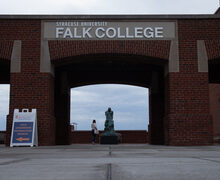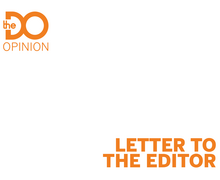Dean of students discusses work with #NotAgainSU protesters
Corey Henry | Photo Editor
Marianne Thomson has often been at the Barnes Center at The Arch, listening to students' concerns.
Dean of Students Marianne Thomson discussed her behind-the-scenes work with student protesters over the past two weeks at a press conference on Thursday.
#NotAgainSU, a movement led by black students, has organized a sit-in at the Barnes Center at The Arch since Nov. 13. Thomson has often been at Barnes Center, listening to students concerns both in public and private.
Several of the demands from protesters fall under Thomson’s purview as dean of students. An 11-page action plan Syracuse University released Tuesday listed Thomsom as the lead official responsible for six demands. Those include stricter punishments for hate speech and harassment in the Code of Student Conduct and the recruitment of more international and multicultural residents.
At the press conference, Thomson addressed her discussions with students and methods for keeping the university accountable. Here are some takeaways from the press conference.
Question: What has it been like behind the scenes, especially after last night when you and others got a lot of arrows shot at you?
Marianne Thomson: A lot of conversation just as it was before. So a lot of individual conversations with students, individual conversations with parents, conversations in groups, trying to really get at the root of what students are needing and wanting. And that’s multilayered.
Q: Is there any way you can give us a timeline on how accurately taken and what will hold the university accountable and living up to what the chancellor signed off on?
M.T.: Yeah so the timelines are different based on the different demands and the different suggestions. One of the things that I think is really important in that I’ve been happy to hear is that we want to do it right. I think it would have been a lot easier to say, “Yes, we’ll do this policy,” and then the next day look at the thing and realize, “Oh, we actually can’t do that for all of these other reasons.”
Before anything was signed off on, we actually were all here on Saturday literally working through each one of all of the background that would need to go into it to say yes. So the yesses actually means something. There’s a lot of timeline in the background that’s not in the document. I’ll tell you why it’s not in the document. We need to work with our students on it. This encapsulates a moment in time of what was needed. But as we continue conversations with students, with faculty, with staff members who are going to need to carry this out, what’s more important is getting it right and obviously doing it as quickly as possible than doing it just to do it.
Q: What is holding the university accountable? How can students be assured that you guys are going to go through with this? Is there anything other than you telling them?
M.T.: I think that’s part of why it was written down. It would have been a lot easier to say, we heard you, we will do this. My whole leadership team is going to work on it. And instead the chancellor, he wanted to get as specific as possible without boxing us in in a way that we would have to …
It’s so that we can actually get to the heart of the issues. Some of the things have to do with, student housing and how you select your roommate. That’s a very, very complex question. It seems very simple at the get-go. Again, need to talk with our students. Lots of different students, not just the ones that we’ve been talking to over the past week and a half. We need to talk to lots of more students in lots more groups to find out how these things will actually play out to get it right.
Q: How are the negotiations over changes to the Code of Student Conduct going?
M.T.: Yeah, so I wouldn’t actually call them that it’s a negotiation. I think what it is is that our students pointed out areas in the code that weren’t clear or written in a way that is digestible for these specific incidents. And I don’t disagree. Where they are right now is that, we will be reaching out to students in the next couple of weeks but also in the spring semester because right now they need to do their finals, finish the semester. So that we can again have more dialogue because a code of conduct is a very, it’s a simple document because it’s only one page, but it’s highly complex because it needs to be flexible enough for you to apply it to any situation.
I’m very proud that last summer we actually redid our code and associated handbook and it sets us up very well for the specific scenario to be able to address the situation in a serious way once the person or people are found. That said, our students, when they read it, that’s not how they feel. That’s important. We need to add some clarifying language to make sure that that those expectations are clear.
Q: Has the mood of talking with students changed in the last two days ago saying till now, because agreements have been signed?
M.T.: I will say it is always changing. An hour ago is probably different than now. Each day it changes. The other thing I’ve really learned from our students. It isn’t surprising that there isn’t one student voice. Some students feel very strongly about some things, others feel differently about other things. And I think that is going back to why can’t we just go ahead and do it right now?
We need to hear that, that complexity. Again, these are the hardest issues. The dynamics are, are fluid and changing. I think the students presented one list of things that they wanted to have happen. When we talked about it, they, the university, we continue to go back and forth to get to a more thoughtful list actually. I think as we continue to talk, we’re going to have more things we need to work on. Again, this is not a box you check. We don’t do these things and then we’re done with diversity and inclusion.
Some questions and responses were edited for clarity.
Published on November 21, 2019 at 8:25 pm
Contact Casey: [email protected] | @caseydarnell_




